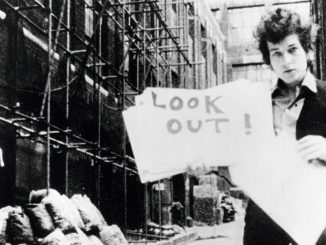
by Jeannine Giesregen
I was going to school and working in a restaurant when I met my former hus- band––a successful businessman whom I knew through my job. Troubled hearts can be drawn together and we were both on the rebound personally. Our issues drew us together like magnets (my self- esteem and his love to stay out and party). We learned to care a great deal for each other and we also learned to always be on the watch for what the other one was doing.
Over time, I realized I was married to an alcoholic. For me, Leaving Las Vegas was the film that most moved me in my adult life. Nicolas Cage plays Ben, an alcoholic Hollywood writer struggling greatly with the disease.
The alcoholic’s life of a rollercoaster is witnessed only slightly in this film, as we see flashes of Ben’s prior life––wife and child leaving, losing jobs, humiliating moments, trying to quit drinking. When we see him giving away his personal pos- sessions and burning things, the actions speak louder than words and, as he heads to Las Vegas, you realize that he is on a mission to kill himself because of his pain and inability to stop drinking.
Many people say addiction is something that can be overcome if you just stop, but it is not that easy. And Leaving Las Vegas illustrates this beautifully.
Once in Vegas, Ben meets Sera, portrayed by Elizabeth Shue, a good-hearted prostitute whom he hires just to talk (because of his drinking, he is unable to…get things done). She has turned to this way of life to make ends meet. She has poor self-esteem and has gotten off on an unintended path in life. She maybe doesn’t think she can do any better than she is doing and gets into a rut. The lifestyle is easy money. But is it really? After she gets beaten up, Sera and Ben set up house.
The traits of those characters are both similar to and different from my own life, yet the basic emotions are the same: They care, but they can’t change the other person––only themselves. The co-dependent relationship can be very dark and twisted; it is amazing how crazy you can get when someone is not doing what you think is right for him or her. If he/she would just do this, it would all be better.
The person who is involved with the addict is sometimes much more messed up than the addict. We see it in Sera’s outbursts and attempts to manipulate and control Ben’s drinking. She tries to get him to sober up and, when he does- n’t, she exhibits outlandish behavior not normal for a sane person. Sera and Ben try to manipulate each other by control- ling money, love and booze. Yet, sadly, they just end up hurting each other.
The movie is so full of contradictions. Life can be just like that…
Leaving Las Vegas gave me a glimpse into the pain of an addict: guilt, obsession, remorse, denial, humiliation and so many other terrible feelings that come the next day after a binge. So why stop and feel the pain? Just keep drinking… I saw my ex lose everything he held dear. Material things didn’t matter anymore. Stealing and not remembering things. Trust is lost in the process and doubt and fear replace it.

The insights I gleaned from the movie allowed me to have empathy for the people who lift that bottle to their lips––for they do get some relief from the great pain they have.
Many people say addiction is something that can be overcome if you just stop, but it is not that easy. And Leaving Las Vegas illustrates this beautifully.
Cage’s portrayal of creative but manic- depressive Ben won him an Oscar and Shue received a nomination. Director Mike Figgis’ screenplay (also Oscar-nominated) was an adaptation of the book written by John O’Brien, who didn’t have to research alcoholism because, sadly, he lived it. O’Brien committed suicide just two weeks after learning that his novel would be made into a movie. His father says that the novel was his suicide note.
In the film, Sera does save herself in the end and Ben finally finds peace from his inner physical battles. This movie helped me find peace and understanding regarding what a person who suffers from addiction—as well as the people who try to control and change him—go through.
My life is so beautiful since I gave up trying to control the uncontrollable. Today, I am divorced but still care about the man who is the father of my most beautiful son. It is okay to love someone who suffers from addiction. My ex suffers from something that I am really grateful I do not have. I can also love myself enough to move on.





